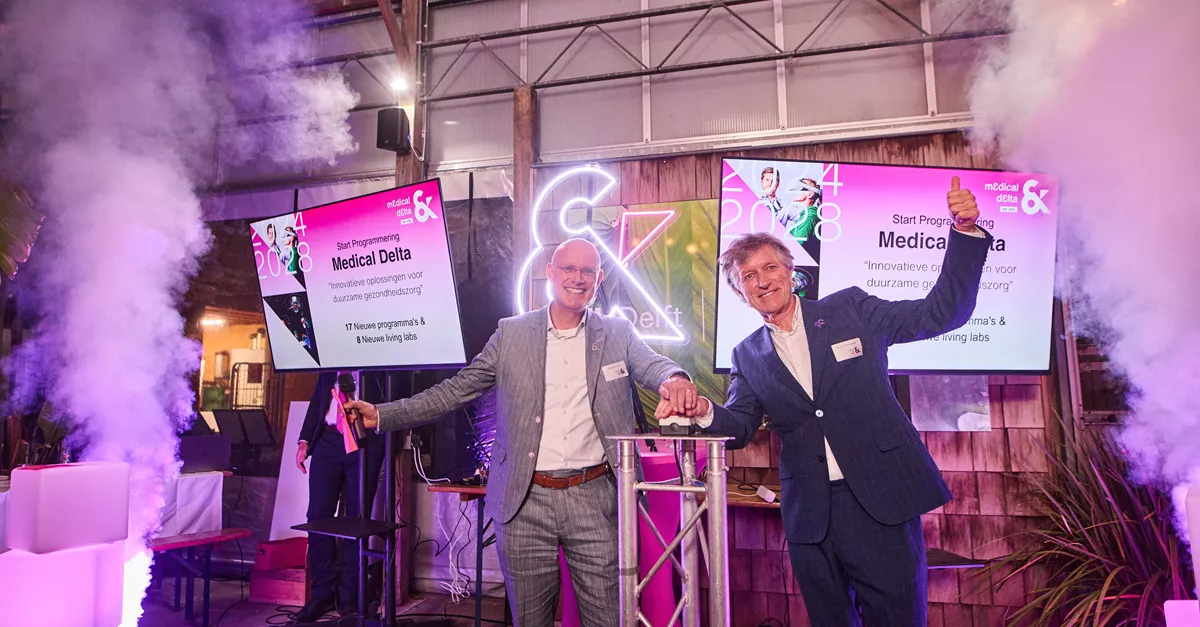Medical Delta invests in the accessibility, staffability, and affordability of healthcare
The Medical Delta program 2024-2028 was officially launched last night. Healthcare professionals and researchers are collaborating on 17 new research programs and 8 new living labs to develop innovative solutions for sustainable healthcare. A total of €6 million in seeding money has been reserved for a four-year period.
With its multi-year program, Medical Delta aims to bring innovation closer to healthcare practice, by making their needs the central focus. Healthcare partners and societal partners are involved from the start in both research and the implementation of innovations. Collaboration and partnerships between universities, hbo and mbo are being intensified. All of this is done under a collaborative mission: to contribute to keeping healthcare accessible, adequately staffed, and affordable using innovative solutions.
The programs and living labs focus on innovation, implementation and research. They are tasked with using the seed funding to further expand their consortium, conduct transdisciplinary and question-based research, and promote the implementation of healthcare innovations. The Medical Delta office supports the consortia in this process.
Remote COPD care, earlier diagnosis of rheumatoid arthritis, and staying healthy with pop music
Questions and needs from healthcare practice are central to the new programming. The programs and living labs are categorized into four clusters, known as ‘societies’, clustered in the themes ‘care’, ‘prevention’, ‘transformation’, and ‘sustainability & greening’.
An example within the ‘care’ society is the Medical Delta Program ‘Appropriate remote COPD care (PASTEL)’, which aims to reduce the number of COPD exacerbations through telemonitoring, wearables, and AI algorithms. Another program investigates how individuals with suspected joint inflammation (rheumatoid arthritis) can receive a diagnosis more quickly using smart technology, requiring less involvement from doctors and at a lower cost. The Medical Delta Program ‘Advanced brain imaging for diagnosis and prediction of dementia’ aims to identify individuals at increased risk of dementia early in order to implement targeted preventive interventions.
The preventive effects of (pop) music and art are being studied in the Medical Delta Program ‘Health promotion with arts and culture’. The Medical Delta Living Lab ‘Vitality implementation and technology (VIT) for Life’ aims to promote a healthier lifestyle for all residents of the province of Zuid-Holland, primarily by facilitating more physical activity and healthy eating. The transformation of healthcare as a whole is also reflected in various programs and living labs. Additionally, the sustainability of healthcare is being emphasized even more – an aspiration shared by many healthcare professionals. Visit Programs and living labs | Medical Delta for a complete overview of programs and living labs.
Innovative innovating: new forms of collaboration
The work on innovative solutions extends beyond the programs and living labs; Medical Delta is also seeking new, innovative methods of collaboration – in terms of both structure and composition.
“Too often, innovations and research findings remain unused, which is a shame. Moreover, we need to innovate differently to make healthcare more sustainable,” says David de Glint, managing director of Medical Delta. “From the start, we involve health(care) and societal partners. This stimulates the new methodologies necessary for the required innovation and implementation. Within the societies, we want to share these experiences to ultimately support healthcare where there is a need.”
Since 2006, scientists from various disciplines have been collaborating within Medical Delta. While Medical Delta initially focused primarily on science and ‘medtech,’ it has broadened its scope in recent years to encompass ‘health and innovation,’ with prevention becoming a key area of focus.
“The healthcare system is under pressure and is in need of innovative solutions that are also practical,” says Prof. Dr. Frank Willem Jansen, chair of Medical Delta. “The broadening and deepening we have initiated is even more prominent in the new programming, allowing for both fundamental and applied research and implementation. Ultimately, that is what is necessary to make healthcare sustainable. We aim to contribute to this goal from the province of Zuid-Holland.”
Date: October 14, 2024
Source: Medical Delta




